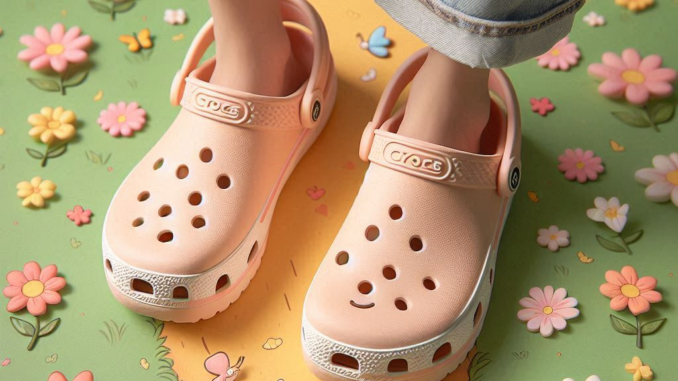
Can You Eat Crocs Shoes?
Have you ever looked at your comfy Crocs and thought, “I wonder what these would taste like?” It might sound crazy, but you’re not alone! This quirky question has popped up more often than you’d think. Let’s dive into this wacky topic and find out if chowing down on your favorite foam clogs is a good idea (spoiler alert: it’s not).
Quick Answer
No, you should not eat Crocs shoes. They are made of non-edible materials that can be harmful if ingested and provide no nutritional value. Eating Crocs could lead to serious health problems and is not recommended under any circumstances.
A Taste of My Own Medicine
Before we dig deeper, let me share a funny story. When I was a kid, I once tried to eat my sister’s rubber duck. I thought it looked like a giant yellow candy. One bite later, I learned the hard way that not everything that looks fun to eat actually is. That rubber duck taught me a valuable lesson about putting strange things in my mouth – a lesson that applies perfectly to our Crocs question!
What Are Crocs Made Of?
To understand why eating Crocs is a bad idea, we need to know what they’re made of. Crocs aren’t your average shoes. They’re special, and here’s why:
- Croslite: This is the secret sauce of Crocs. It’s a special foam that makes the shoes super comfy.
- Closed-cell resin: This fancy term means the material is full of tiny bubbles that don’t connect. It’s why Crocs are light and bouncy.
- Other materials: Some Crocs have extra bits like fabric or metal for style or function.
None of these materials are meant to be eaten. They’re great for your feet, but terrible for your tummy!
Why Eating Crocs Is a Bad Idea
Now, let’s break down the reasons why you shouldn’t munch on your favorite foam clogs:
1. Health Risks
Eating Crocs could make you really sick. Here’s how:
- Choking hazard: Bits of Crocs could get stuck in your throat.
- Tummy troubles: Your body can’t digest Croslite, which could lead to stomachaches or worse.
- Tooth damage: Chewing on hard plastic isn’t good for your teeth.
- Chemical exposure: While Crocs are safe to wear, the chemicals in them aren’t meant to be eaten.
2. Zero Nutrition
Crocs might fill your stomach, but they won’t feed your body. They have:
- No vitamins
- No minerals
- No protein
- No carbs
- No healthy fats
In short, eating Crocs would be like eating air – except air doesn’t get stuck in your gut!
3. It’s Wasteful
Crocs are meant to protect your feet, not fill your belly. Eating them would be a waste of:
- Money: Crocs aren’t cheap!
- Resources: Making Crocs uses energy and materials.
- Perfectly good shoes: Someone else could use them if you don’t want them anymore.
What Happens If You Eat Crocs?
Let’s say someone ignored all the warnings and took a big bite of their Crocs. What might happen?
- Immediate effects: They might choke, gag, or hurt their teeth.
- Short-term problems: They could get a tummy ache, feel sick, or throw up.
- Long-term issues: The Crocs material might get stuck in their gut, causing serious problems that need a doctor’s help.
Remember, these are just possibilities. The exact effects would depend on how much was eaten and the person’s health. But why risk it?
The Great Crocs Eating Challenge: A Cautionary Tale
Believe it or not, some folks have actually tried to eat Crocs! Here’s a story that made the rounds on social media:
“I saw this challenge online where people were taking bites out of their Crocs. I thought it was hilarious, so I decided to try it. I took one small bite and immediately regretted it. It tasted awful, and I couldn’t even swallow it. My teeth hurt, and I felt silly. I spit it out and learned my lesson – some challenges are just plain dumb!”
This story shows us that even a small taste can be unpleasant and potentially dangerous. It’s best to keep Crocs on your feet, not in your mouth!
Fun Facts About Crocs (That Don’t Involve Eating Them)
Instead of wondering if you can eat Crocs, check out these cool facts:
- Crocs were invented in 2002 as boating shoes.
- They were named after crocodiles because they’re tough and adaptable.
- Over 600 million pairs of Crocs have been sold worldwide.
- Crocs come in over 20 different styles and hundreds of colors.
- Some hospitals use Crocs because they’re easy to clean and comfortable for long shifts.
What To Do With Old Crocs
If you’re tired of your Crocs but don’t want to eat them (good choice!), here are some better ideas:
1. Donate Them
If your Crocs are still in good shape, give them to someone who needs them. Many charities accept gently used shoes.
2. Recycle Them
Crocs has a recycling program called “Crocs Recycle” where you can send in your old pairs. They turn them into new shoes!
3. Get Creative
Use your old Crocs for fun projects:
- Make them into planters for small plants.
- Use them as organizers for small items in your garage.
- Turn them into fun outdoor decorations.
Wrapping Up: Keep Your Crocs on Your Feet!
So, can you eat Crocs shoes? The answer is a big, loud “NO!” It’s not safe, not healthy, and definitely not tasty. Crocs are awesome for walking, lounging, and showing off your style, but they’re not for eating.
Remember, just because something looks fun or silly doesn’t mean it’s a good idea. Stick to eating real food and keep your Crocs where they belong – on your feet or donated to someone who needs them.
Got any other weird questions about things you shouldn’t eat? Keep them coming! It’s always fun to explore the wacky side of life, as long as we stay safe and smart about it.
Note
- If you’re hungry, grab a healthy snack instead of eyeing your shoes.
- Share this article with friends who might get a kick out of it.
- Check out Crocs’ website to learn more about their recycling program if you have old pairs to get rid of.
- Most importantly, keep being curious and asking questions – just maybe don’t try to eat the answers!


Leave a Reply